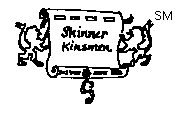

- Volume 3 Number 1
- Winter 1986
- American Ethnicity
- Ancient Skinner Lines
- Myrtle S. Bohme Lineage
- Clan MacGregor
- Cook Co., IL Census
- Cook Co., IL Wills
- Thelma C. (Browning) Dalberg Lineage
- Dead Briton - KGB
- Debrett Update
- Elephant two-step
- Guild of One Name Studies
- History of Eugene, Oregon (Chapter 1)
- Letter From the Editor
- Medical Quirks
- miscSKlNNERlaneous
- New Jersey Settlers
- New Jersey Update
- Off Broadway
- Passages
- Queries
- Resources
- Skinner-Hope Family Record
- Jane Skinner Obituary
- John Skinner of Hoodbridge
- Josiah Skinner Will
- Robert Skinner Line
- William Skinner Lineage
- Skinner Places
- Skinner Variants
- Skinner's a hit
- Vision Quest
- Worshipful Company of Skinners
- Winter 1986
Thanks to William Weiler for transcription of this article.
CHAPTER 1
THE FIRST SETTLERS
(Thanks to the Eugene Public Library for the following information.)
It was June in the year of 1846 in the Willamette Valley. Four white men on horseback came riding south on the Indian trail along the foothills of the Cascade Mountains. As they rode, they studied the valley to the west of them carefully.
England and the United States had both been claiming this land for several years. England had, just that month, given up her claim. The Oregon Country, lying between the Rocky Mountains and the Pacific Ocean, had thus become part of the United States. Its rich land was free to settlers -- six hundred forty acres to each man who came to claim it.
The four men were looking for some of this free land where they could build homes for their families. The name of one of the men was Eugene Skinner, and it was he for whom the city of Eugene was later named. With him were Elijah Bristow, William Dodson, and Felix Scott, Jr.
The horsemen rode along near the foot of the Coburg Hills and swam the cold McKenzie River. Passing a few miles northeast of the present city, they came to the middle fork of the Willamette River which they also crossed. They liked the looks of the land in this upper end of the valley. Three of them
Elijah Bristow is reported to have said when he saw the place, "This is my claim! Here I will live, and when I die, here shall I be buried." The countryside reminded him of Pleasant Hill, Virginia where he had spent his childhood. Being the first to stake out his claim, Mr. Bristow became the first settler in Lane County. Mr. Dodson and Mr. Scott chose land next to the Bristow claim.
To lay claim to their square mile of land they had to "step off" the claim, drive stakes at the corners of the piece of land, and place a few logs together in the shape of a cabin on each claim.
Mr. Skinner did not find the site he wanted there. He and his companions turned about and started back north along the western side of the river. Within ten or twelve miles they came to a butte near the Willamette. It stood high above the surrounding valley floor and offered a good place from which to see the country. It was known as Ya
The travelers climbed the butte. Mr. Skinner walked back and forth on the summit several times enjoying the view before him. Finally he said, "Boys, you take up your claims where you like best; this spot of ground is good enough for Eugene Skinner and his family. The location is beautiful, surrounded by these hills, reminding me of a bird's nest, and with this beautiful river on the north side of this butte, is an ideal place for a home." He then staked out his claim at the western base of the butte. His donation claim is now part of the city of Eugene, extending from Monroe Street to 8th Street to the river.
Having chosen their home sites, the men returned to Richreall and Independence, seventy miles to the north, to get the belongings which they had left there with friends. Mr. Skinner's wife, Mary, and their baby daughter, Mary Elizabeth, were there, too. Mr. Bristow's wife, Susanna, and their children were still in Illinois, waiting for Elijah to send word that he had a home ready for them.
(continued next issue)